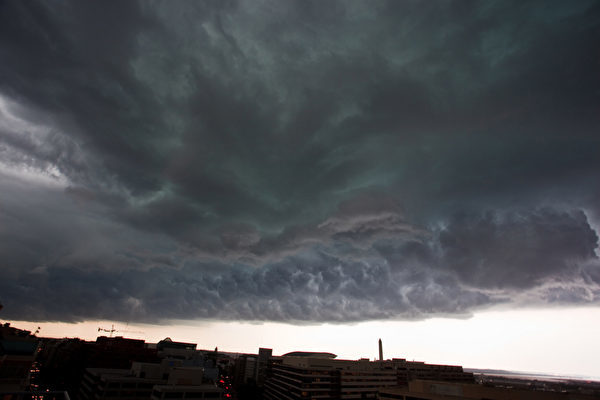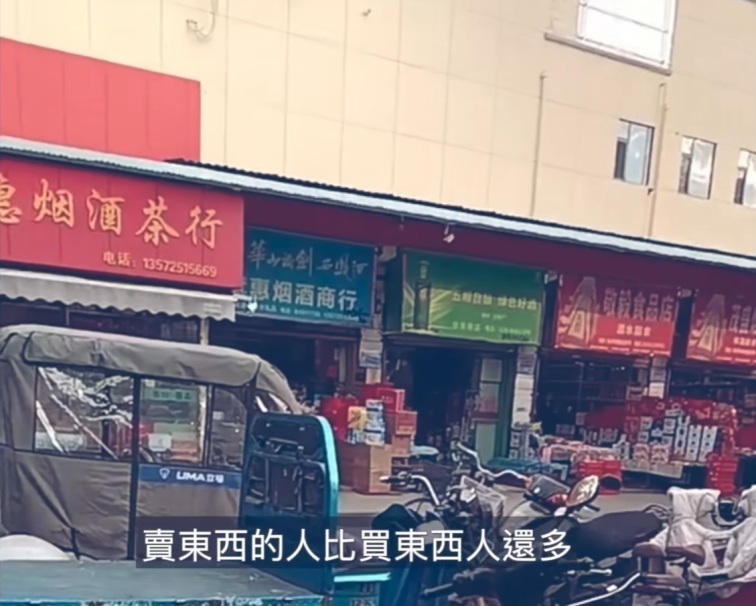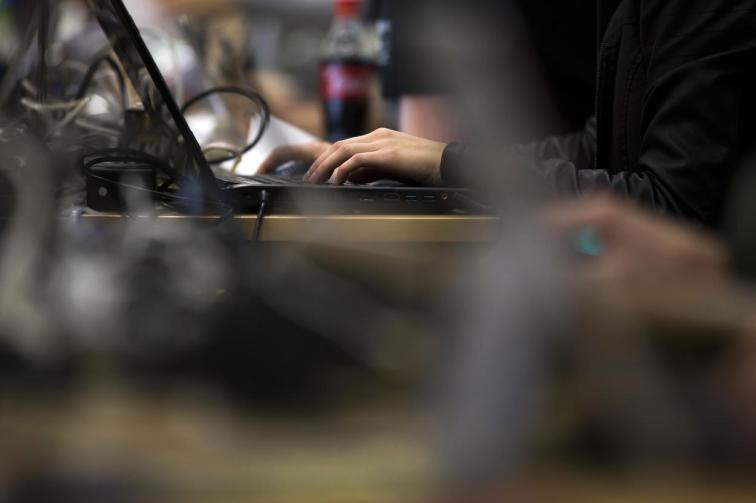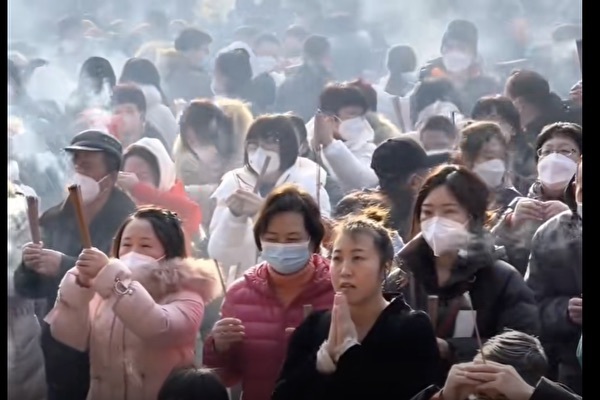During the Spring Festival travel season, a bizarre phenomenon has emerged where tickets are unavailable for purchase, yet high-speed rail carriages are empty. (Video screenshot)
[People News] With just one week remaining until the Chinese New Year and in the context of an economic downturn, saving money during the holiday has become a hot topic. During the Spring Festival travel season, a strange phenomenon has occurred where tickets are sold out, yet high-speed rail carriages remain empty. Additionally, multiple local governments have issued directives advocating for frugal and civilized celebrations, even calling for a curb on extravagant banquets.
According to a report by Radio Free Asia, China’s Spring Festival travel season has been underway for a week. People’s Daily quoted the Guangzhou Railway Group, stating that cumulative passenger volume has reached 13.371 million, a year-on-year increase of 2%, or 328,000 more passengers than the same period last year. However, numerous videos on Douyin (TikTok) show nearly empty high-speed train cars during this busy season, sparking online skepticism. Many netizens question why tickets require waitlisting, yet the trains are empty once boarded.
A netizen using the handle "Half Brow" remarked: "I was misled when buying tickets for the high-speed train. It showed that first-class seats were almost sold out, and second-class seats were also limited. But once I got on the train, I found I was the only passenger in the entire car. The train is approaching the next station, yet it’s still empty."
Another user, "Guangzhou Videographer," commented: "This is this year’s Spring Festival travel train car. Why are the high-speed rail cars empty? Where did everyone go? I don’t know. It’s completely different from past years. Are people not going home for the New Year this year? Or have they switched to other transportation methods—like fast walking or jogging—to get home?"
Citizens Opt for Trains Over High-Speed Rail to Save Money
A search on China Railway’s "12306" ticketing platform shows that high-speed rail tickets for many destinations require waitlisting. However, Mr. Hu, who travels annually from Guangdong to Changsha for the New Year, shared that his friends are all taking regular trains this year instead of high-speed rail. He explained that high-speed rail fares spike before the New Year, costing several times more than traditional trains. People are willing to endure longer travel times to save money.
Videos showing empty high-speed rail carriages during the Spring Festival travel season have surfaced on Douyin, yet a check of the ticket booking platform reveals only waitlisted tickets available.
Hu said: "A green train from Guangzhou to Changsha takes nine hours and costs around 100 yuan or just over that. But a high-speed train ticket is nearly 400 yuan, three to four times more expensive. The green trains are always crowded during the New Year period, but this year there are even more passengers than usual. It’s very packed—aisles, doorways, and restrooms are all full of people and luggage. Because the economy isn’t doing well, the government has also reduced the number of green train services, forcing people with lower incomes to buy high-speed rail tickets if they want to go home."
Regarding the phenomenon of empty high-speed rail cars despite ticket unavailability on the platform, Hu attributed it to ticket agents and travel agencies. In previous years, they would reserve tickets to charge service fees, but this year, with fewer high-speed rail passengers, these agents miscalculated demand. Hu expressed concerns about the poor economy, noting that he’s uncertain about job security after the holiday. This uncertainty is prompting many to cut back on spending during the New Year.
"Everyone can feel the tough economic situation," Hu said. "Spending during the New Year will definitely be less than in past years. People might go out less, buy fewer things, and even give out smaller red envelopes. Future spending will shrink; everyone is tightening their budgets. The economic outlook doesn’t seem to be improving anytime soon—not for many years. There’s no clear direction."
Local Governments Advocate Frugality for Lunar New Year
As the Chinese New Year approaches, many local governments in China have issued guidelines promoting frugal and "civilized" celebrations. On January 21, Zhenxiong County in Yunnan Province released a "Proposal to Resist Extravagant Banquets," urging Party members and officials to take the lead. The proposal included hotline numbers for reporting violations from ten town and village governments, sparking heated discussion. Similarly, Guangxi, Hebei, Sichuan, and other regions have issued various guidelines encouraging modest celebrations. In Baise City, Guangxi, officials suggested giving red envelopes with no more than 20 yuan, which has become a trending topic online.
Mr. Huang, a Beijing resident, acknowledged these proposals but doubted their practicality: "If you earn more, you can celebrate better; if you earn less, you tighten your belt. Chinese people care about face—20 yuan in the city is simply unacceptable. You have to give at least 100 yuan. For me, I give red envelopes to fewer than 10 people, which is manageable. I’ll endure the cost because it’s tradition, but I’ll cut back on other expenses. For the younger generation, you have to give—it’s non-negotiable. If I had to give 20 or 30 envelopes of 100 yuan each, that’d be 2,000 to 3,000 yuan. I could manage it, but I wouldn’t be happy about it."
Huang lamented the economic downturn, noting a marked decline in festive atmosphere in Beijing this year. He observed many stores closing before the New Year and said the mood is generally downbeat.
"You can see it on the streets—there are far fewer people. Earning money is getting harder, and for some, impossible. Many of my acquaintances are complaining about poor business. Not one person I know is saying their business is thriving. Stores are closing left and right. Regardless of the industry, there’s a sense of frustration. Those with savings are relying on them to get by."
Independent commentator Jifeng noted that local governments’ frugality campaigns have hit many industries hard. He cited Guizhou as an example, where even the Moutai liquor company reported sluggish business before the New Year.
"Moutai isn’t selling this year—prices have dropped to 2,000 yuan. A friend of mine who owns a liquor business said it’s nothing like past years when the New Year rush would bring crowds to buy liquor. This year, I called him, and he said business is bad, with hardly anyone buying. When people cut back on lavish spending, they stop buying or buy less liquor, and that makes things tough for the industry. Liquor factories need cash flow to survive, but now they’re selling below cost just to move stock."
Jifeng argued that the government’s push for "civilized celebrations" serves another purpose: to downplay the economic struggles and the inability of many citizens to celebrate lavishly.
"Economic decline is forcing people to tighten their belts, but whose belts are being tightened? Ours. This rhetoric about 'civilized celebrations' is essentially a way to mask the fact that there’s no money. They’re trying to present a dignified excuse, framing it as a 'revolutionary' New Year—self-reliance, thrift, and no extravagance. But it’s all about making it sound noble."
Economist Siling noted a stark contradiction between local governments’ self-praise during the annual sessions of the People's Congress—touting economic growth—and their calls for frugality. He believes these measures are intended to manage public sentiment.
"In the media, they’re singing praises about the 'bright future' of China’s economy in 2025, but the government is well aware of the financial struggles of the 70% of the population in the workforce—salaried workers and laborers. Their wallets are thinner than in previous years, and the government needs a reasonable explanation. Hence, they’re guiding public opinion with documents urging people to avoid excessive consumption. The subtext is that people don’t have much money, so here’s an excuse to scale back."
Siling predicted that the economic downturn would persist, with a wave of layoffs and closures likely after the New Year. He expects a new surge of bankruptcies and unemployment in the coming months.










News magazine bootstrap themes!
I like this themes, fast loading and look profesional
Thank you Carlos!
You're welcome!
Please support me with give positive rating!
Yes Sure!